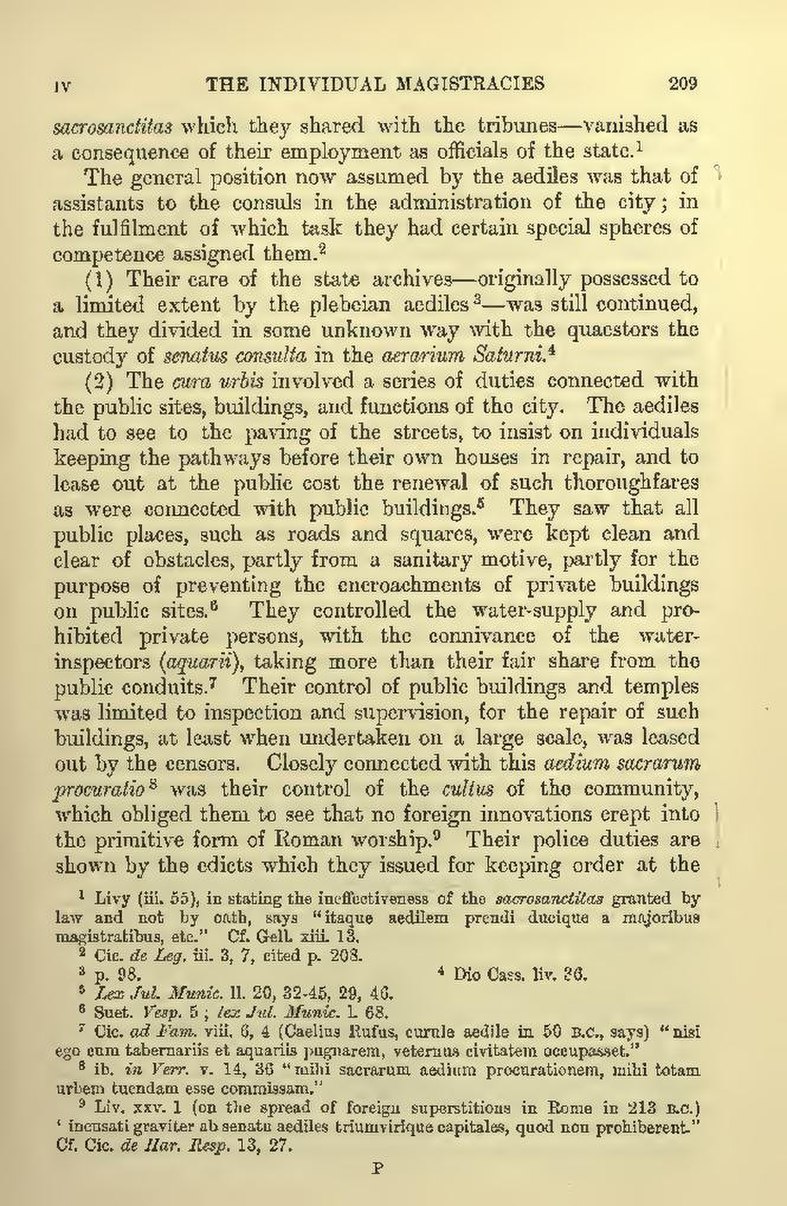sacrosanctitas which they shared with the tribunes—vanished as a consequence of their employment as officials of the state.[1]
The general position now assumed by the aediles was that of assistants to the consuls in the administration of the city; in the fulfilment of which task they had certain special spheres of competence assigned them.[2]
(1) Their care of the state archives—originally possessed to a limited extent by the plebeian aediles[3]—was still continued, and they divided in some unknown way with the quaestors the custody of senatus consulta in the aerarium Saturni.[4]
(2) The cura urbis involved a series of duties connected with the public sites, buildings, and functions of the city. The aediles had to see to the paving of the streets, to insist on individuals keeping the pathways before their own houses in repair, and to lease out at the public cost the renewal of such thoroughfares as were connected with public buildings.[5] They saw that all public places, such as roads and squares, were kept clean and clear of obstacles, partly from a sanitary motive, partly for the purpose of preventing the encroachments of private buildings on public sites.[6] They controlled the water-supply and prohibited private persons, with the connivance of the water-inspectors (aquarii), taking more than their fair share from the public conduits.[7] Their control of public buildings and temples was limited to inspection and supervision, for the repair of such buildings, at least when undertaken on a large scale, was leased out by the censors. Closely connected with this aedium sacrarum procuratio[8] was their control of the cultus of the community, which obliged them to see that no foreign innovations crept into the primitive form of Roman worship.[9] Their police duties are shown by the edicts which they issued for keeping order at the
- ↑ Livy (iii. 55), in stating the ineffectiveness of the sacrosanctitas granted by law and not by oath, says "itaque aedilem prendi ducique a majoribus magistratibus, etc." Cf. Gell. xiii. 13.
- ↑ Cic. de Leg. iii. 3, 7, cited p. 208.
- ↑ p. 98.
- ↑ Dio Cass. liv. 36.
- ↑ Lex Jul. Munic. ll. 20, 32-45, 29, 46.
- ↑ Suet. Vesp. 5; lex Jul. Munic. l. 68.
- ↑ Cic. ad Fam. viii. 6, 4 (Caelius Rufus, curule aedile in 50 B.C., says) "nisi ego cum tabernariis et aquariis pugnarem, veternus civitatem occupasset."
- ↑ ib. in Verr. v. 14, 36 "mihi sacrarum aedium procurationem, mihi totam urbem tuendam esse commissam."
- ↑ Liv. xxv. 1 (on the spread of foreign superstitions in Rome in 213 B.C.) 'incusati graviter ab senatu aediles triumvirique capitales, quod non prohiberent." Cf. Cic. de Har. Resp. 13, 27.
